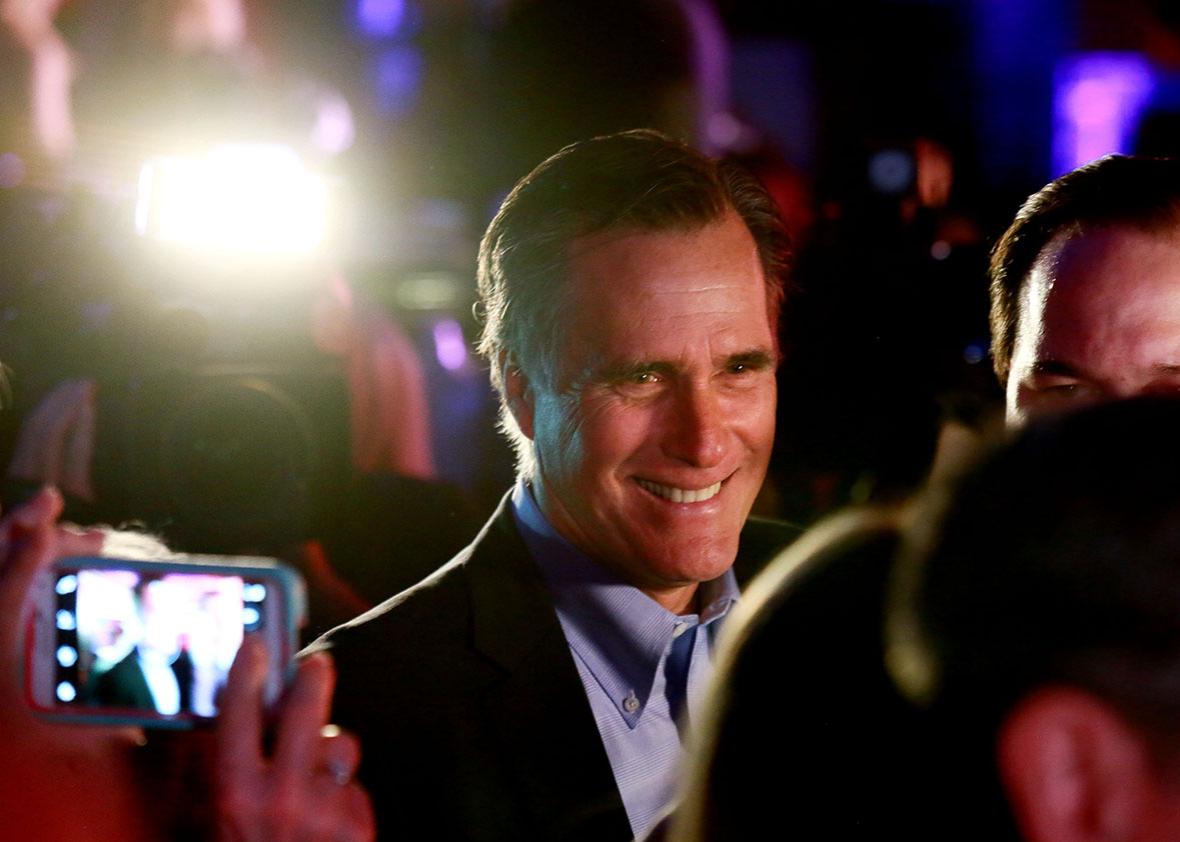Think back to this time in the 2012 Republican presidential primary, and it’s easy to see the similiarities. Mitt Romney was the most plausible nominee in a wide field of contenders, but he couldn’t catch fire with the GOP base. Instead, he watched a parade of outsiders and conservative alternatives take their turns in the sun, from Rick Perry and Herman Cain to Newt Gingrich and Rick Santorum.
But behind this chaos was a certain order. For as much as Romney struggled against conservative enthusiasm for vanity candidates, he also held a steady place in the polls, with strong fundraising and a solid, professional organization. Romney wasn’t the first choice for the majority of Republican primary voters, but he was the first alternate for when everyone’s various infatuations died down. “Romney was viewed positively by likely Republican primary voters regardless of whether they were conservatives or moderates, pro-life or pro-choice, relatively wealthy or not, Tea Party members or not,” write political scientists John Sides and Lynn Vavreck in The Gamble: Choice and Chance in the 2012 Presidential Election. What’s more, Romney had high ratings among voters who backed candidates like Cain and Gingrich: “About 74 percent of conservative Republican primary voters had a favorable view of him,” they write. When it was time to choose, Romney was the strongest contender, and Republicans were ready to pick him.
This year, with Donald Trump leading the fray, there’s something of a consolidated conservative movement—the real estate magnate draws from the same voters who gave Cain and Gingrich their time in the light. And in that space, he’s joined by Ben Carson, the neurosurgeon-turned public speaker-turned presidential candidate, who hits second place in most national polls of the GOP primary field. But votes are just one part of this game; you need party support too, and that’s just not in the cards for either Trump or Carson. Both will eventually fade from view—or at least the Republican nominating process—as voters start the more serious search for a nominee. The problem, this time, is that there isn’t a Romney—an obvious choice for consolidation who is on the steady march to inevitability. Instead, there’s a collection of “plausible” candidates who all seem too flawed to succeed.
Take John Kasich. The Ohio governor has a great résumé: a former congressman and chairman of the House Budget Committee who had a lucrative stint in investment banking before winning a tight race in a swing state. And he’s poised to excel in a general election; an advocate for the Medicaid expansion in the Affordable Care Act, he’s a genuine “compassionate conservative” with a strong message on mental health and drug treatment services. But that’s also his problem. The Republican Party is still committed to the destruction of Obamacare, and Kasich doesn’t just support one of its largest components—he also shames Republicans who don’t. “Now, when you die and get to the meeting with St. Peter, he’s probably not going to ask you much about what you did about keeping government small,” Kasich said at the presidential debate. “But he is going to ask you what you did for the poor. You better have a good answer.”
Which is to say that if a “plausible” nominee needs to be acceptable to conservatives, Kasich is at a serious disadvantage. They might tolerate the Medicaid expansion, but they won’t stand for that kind of attack. New Jersey Gov. Chris Christie—a relative moderate—is in the same boat, with the added anchor of scandal. He’s trying, though; on Saturday, in an awkward pitch to conservative voters, he promised to “track” unauthorized immigrants like FedEx packages, if elected president.
Wisconsin Gov. Scott Walker has the conservative bona fides and the résumé. But his credentials can’t compensate for his poor performance. Walker is too slow to respond to criticism, and too flat-footed against Trump, who has boxed him out of his political space.
Which brings us to Jeb Bush, who looks Romney-esque with his deep pockets and strong ties to the Republican establishment. With backing from prominent parts of the GOP, he has the key advantage in a presidential primary—party support. That, and money, can keep him buoyed if he stumbles in the early primaries, and eventually bring him to victory. But that assumes a strong campaign, which, in part, assumes a strong candidate. That’s not the Jeb we have. Like Walker, Bush has stumbled over Trump and his attacks, with ineffectual pushback that leads to more mistakes. Last week, addressing immigration, Bush blamed “anchor babies” on Asian immigrants, spreading offense to new demographics. And over the weekend, reports Politico, Bush lost three top fundraisers, amid reports of “internal personality conflicts and questions about the strength of his candidacy.” Winning campaigns don’t tend to have this problem; Romney didn’t.
The only “plausible” candidate left—someone to bridge the gaps among all party factions—is Florida Sen. Marco Rubio. What he lacks in Bush’s money or Walker’s electoral success he has in raw talent: Rubio is the most gifted communicator of the field, with enough savvy to avoid Trump’s traps. He doesn’t engage Trump on immigration or try to swat him away. Instead, he talks policy, tries to distinguish himself with substance, and marches toward his goal.
Rubio, in other words, has the simple combination of discipline and message—movement conservatism, shorn of its roughest edges—that leads to victory. He, put differently, is the closet candidate in the field to the last election’s Romney. If I were a Republican donor or activist trying to make a decision, I’d give the young senator another look.
